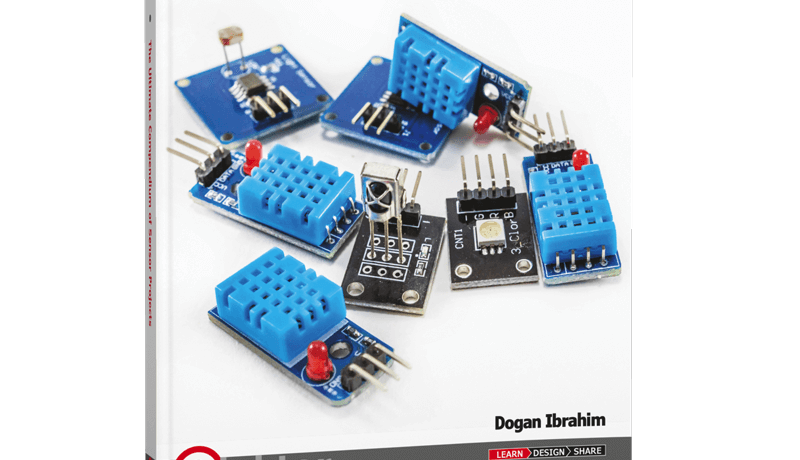Book Review: The Ultimate Compendium Of Sensor Projects
January 21, 2020
on
on

Sensors are a worthwhile topic to write about: They bring electronics projects in contact with the real world and facilitate all kinds of practical applications. Dogan Ibrahim describes more than 40 projects in this comprehensive book, and because it is not self-evident to buy all these components separately, he relies on an existing kit, the JOY-iT Sensor Kit X40. Each of these sensors in the kit is located on a small circuit board, which is simply plugged onto a breadboard for experimentation. The term "sensors" in the name of the kit and the book can be interpreted rather widely: It also includes buttons (which are also a kind of sensors in themselves), LEDs and an infrared transmitter and receiver. This of course only makes it so much more interesting.
The book is written in the academic style characteristic of Dogan Ibrahim: very instructive, using the same clear structure for each project, including block diagram, electronic circuit and program code. This ensures that each of the projects is almost self-contained and can easily be realized. But if you read the whole book in one go, it gets a little boring after a while, because the same principles pop up over and over again. You will enjoy this book most if you select chapters from it over a longer period of time, which appeal to you and then experiment with them. Another downside is that the author's Python code still uses Python 2, which is no longer supported. Keep this in mind when you develop projects for the Raspberry Pi.
The best thing about this book is also that it tells how the components can be used on three platforms: Arduino, Raspberry Pi and ESP32. For each of the platforms, a separate chapter at the beginning of the book explains how to use them (Installing the Arduino IDE and Raspbian and the Board Manager for ESP32 in the Arduino IDE). The author then works out projects for some of the simple sensors for all three platforms. This is very instructive, allowing you to instantly see the different approaches used by the platforms.
The book and sensor kit are also available in an affordable bundle.
Author: Dogan Ibrahim
Publisher: Elektor International Media
Price: € 34.95
ISBN: 978-1-907920-78-3
www.elektor.com/ultimate-compendium
The book is written in the academic style characteristic of Dogan Ibrahim: very instructive, using the same clear structure for each project, including block diagram, electronic circuit and program code. This ensures that each of the projects is almost self-contained and can easily be realized. But if you read the whole book in one go, it gets a little boring after a while, because the same principles pop up over and over again. You will enjoy this book most if you select chapters from it over a longer period of time, which appeal to you and then experiment with them. Another downside is that the author's Python code still uses Python 2, which is no longer supported. Keep this in mind when you develop projects for the Raspberry Pi.
The best thing about this book is also that it tells how the components can be used on three platforms: Arduino, Raspberry Pi and ESP32. For each of the platforms, a separate chapter at the beginning of the book explains how to use them (Installing the Arduino IDE and Raspbian and the Board Manager for ESP32 in the Arduino IDE). The author then works out projects for some of the simple sensors for all three platforms. This is very instructive, allowing you to instantly see the different approaches used by the platforms.
The book and sensor kit are also available in an affordable bundle.
Author: Dogan Ibrahim
Publisher: Elektor International Media
Price: € 34.95
ISBN: 978-1-907920-78-3
www.elektor.com/ultimate-compendium
Read full article
Hide full article



Discussion (0 comments)